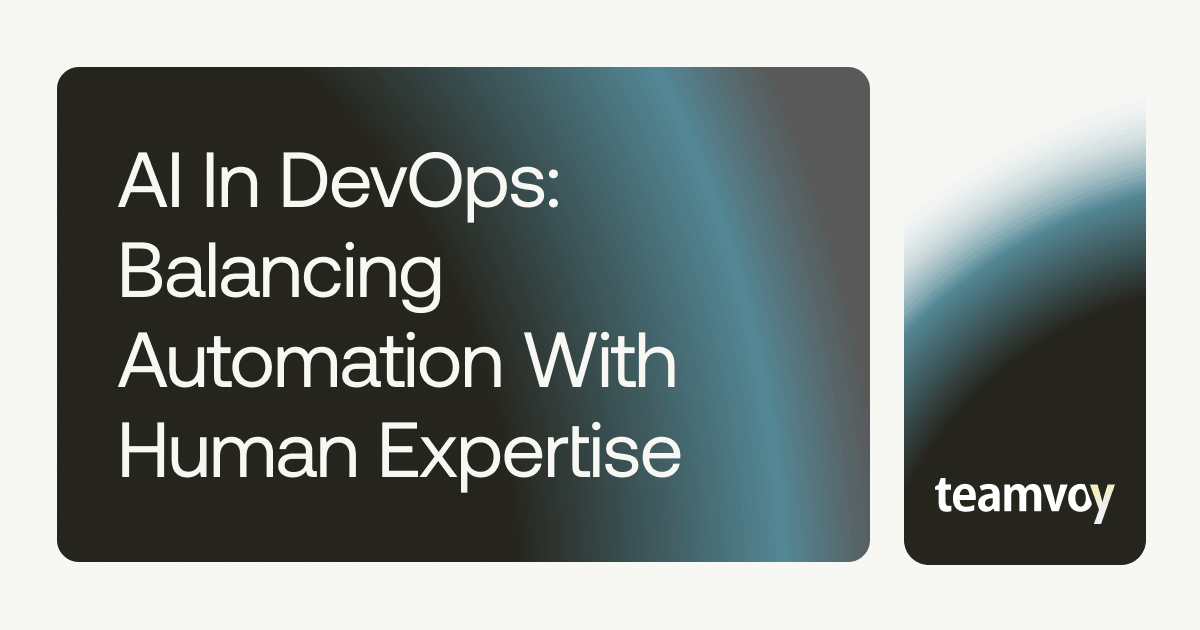Posted:
Updated:
Home → Blog → AI in DevOps: Balancing Automation with Human Expertise
AI in DevOps
Artificial intelligence (AI) has rapidly become a buzzword across industries: from business operations to cloud services. Terms like generative AI, agentic AI and AI agents appear in the headlines every day, while companies rush to adopt AI tools, promising cutting-edge automation and smarter workflows. In the DevOps world, this trend is visible also: where speed, scalability, and efficiency are crucial, AI is presented as a transformative force.
But is this really the case? While AI technology can indeed boost productivity, analyze data at scale and assist in decision-making, it is not an engineer. AI is still not capable of replacing human expertise, creativity or problem-solving. Instead, it serves as a tool useful only in the right hands. Without proper guidance and context, relying too heavily on artificial intelligence in DevOps can be just as harmful as it is beneficial.

Pros of using AI in DevOps
Despite all the debates around artificial intelligence, there’s no denying that AI tools can be genuinely helpful in the DevOps field, if used the right way. Here are a few clear benefits:
- Faster learning and research
DevOps is not just one skill. It is a mix of infrastructure, automation, monitoring, security and countless tools. For anyone trying to keep up, this can feel overwhelming. With AI technology, you don’t have to start from scratch each time. Whether you’re exploring Kubernetes, Terraform or CI/CD pipelines, AI can speed up the learning process. Even better, if you hit a roadblock, like not understanding one concept while researching another, you can immediately ask for clarification instead of switching tabs for hours.
- Saving time on trivialities
One of the biggest wins of AI in DevOps is avoiding wasted time on small, but routine tasks. You do not need to memorize every bash syntax detail, regex trick or YAML configurations. Instead, AI agents can generate snippets, automate simple processes or even build custom scripts for you in a matter of minutes. That frees up engineers to focus on what really matters: designing architecture, solving complex problems and delivering value to the business.
- Narrowing down the search space
DevOps is broad. From bare-metal servers to web frontends – the scope of responsibilities can stretch across an entire IT landscape. When something goes wrong, finding the root cause can feel like looking for a needle in a haystack. While AI won’t magically solve every advanced issue, it can narrow down your search and point you in the right direction. That alone can save hours of troubleshooting, especially when you’re dealing with large-scale systems.
AI tools in DevOps can cut through complexity, speed up research and automate the small stuff. When used wisely, they free engineers to focus on building, solving and scaling what truly drives the business forward.
Transform your DevOps with our AI consulting services!
Cons of using AI in DevOps
For all the hype around artificial intelligence in business and tech, there are serious drawbacks when it comes to DevOps. The field relies heavily on precision, customization, and constant evolution – areas where AI often falls short.
- Precision and attention to detail
DevOps is unforgiving. A single typo in a configuration file can crash a deployment, take down services or block entire pipelines. While AI agents and AI tools can generate code and configs quickly, they’re also prone to “hallucinations” and subtle errors. And unlike a human engineer, AI won’t feel the weight of responsibility when something breaks.
- The endless cycle of troubleshooting
Troubleshooting is where DevOps engineers really earn their stripes. Complex systems have unique dependencies, integrations, and history that AI simply doesn’t understand. If you rely too much on AI to debug from start to finish, you’ll likely end up in an endless loop of generic suggestions, none of which get you closer to solving your actual problem.
- Constant evolution of tools
DevOps is one of the fastest-changing fields in IT. Tools, versions and best practices evolve almost monthly. AI technology struggles to keep up with these changes, often suggesting outdated syntax, deprecated configurations or incorrect options. This mismatch can create even more work for engineers instead of less.
- Advanced configuration and niche elements
Some DevOps tools are highly specialized or used in very specific ways. For example, advanced Helm charts, custom Terraform modules or niche monitoring setups. In these cases, generative AI often lacks enough relevant training data to provide useful solutions. It might give you a starting point, but it won’t replace deep expertise with advanced configurations.
While AI technology can accelerate simple tasks, it struggles with the precision, complexity, and constant change that define DevOps. Without careful oversight, it risks creating more problems than it solves.
Conclusion
AI in DevOps is both promising and problematic. On one hand, artificial intelligence offers powerful shortcuts: speeding up research, automating trivial tasks and narrowing down troubleshooting paths. On the other hand, its flaws: lack of precision, outdated knowledge and inability to handle advanced, custom setups make it unreliable as a standalone solution.
That’s why the real takeaway is simple: AI is not an engineer, it’s a tool. Like any other AI technology, its value depends entirely on who is using it and how. In the right hands, AI tools, AI agents and even generative AI can boost productivity and help businesses scale. But without skilled people guiding the process, it’s just another layer of risk.
As companies explore AI services and consulting around DevOps, the key is balance. Use AI where it shines: handling repetitive work, speeding up learning, and offering quick insights. But don’t expect it to replace expertise, judgment, or responsibility. In DevOps, success comes from engineers supported by cutting-edge AI, not replaced by it.






